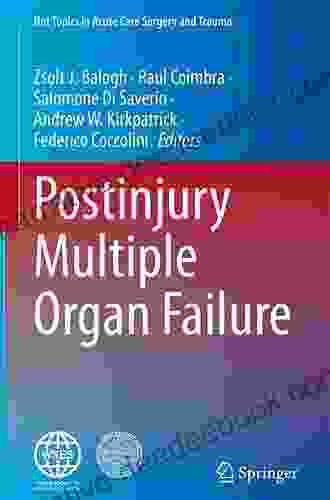Postinjury Multiple Organ Failure: Hot Topics in Acute Care Surgery and Trauma

Postinjury multiple organ failure (PMOF) is a complex and life-threatening condition that occurs in approximately 10% of critically ill trauma patients. PMOF is characterized by the failure of two or more organs following a severe injury, and it is associated with a high mortality rate. The pathophysiology of PMOF is not fully understood, but it is thought to involve a combination of factors, including systemic inflammation, hypoperfusion, and apoptosis.
4.3 out of 5
| Language | : | English |
| File size | : | 9929 KB |
| Text-to-Speech | : | Enabled |
| Enhanced typesetting | : | Enabled |
| Print length | : | 587 pages |
| Screen Reader | : | Supported |
Risk Factors
There are a number of risk factors for PMOF, including:
* The severity of the injury * The presence of sepsis * The development of acute respiratory distress syndrome (ARDS) * Advanced age * Comorbid conditions, such as diabetes and heart disease
Pathophysiology
The pathophysiology of PMOF is complex and not fully understood. However, it is thought to involve a combination of factors, including:
* Systemic inflammation: Following a severe injury, there is a release of inflammatory mediators, such as cytokines and chemokines. These mediators can cause widespread inflammation, which can lead to organ damage. * Hypoperfusion: Severe injury can lead to hypoperfusion, or decreased blood flow to the organs. This can lead to organ ischemia and damage. * Apoptosis: Apoptosis, or programmed cell death, is a normal process that occurs in the body. However, following a severe injury, there can be an excessive amount of apoptosis, which can lead to organ damage.
Clinical Presentation
The clinical presentation of PMOF can vary depending on the organs that are involved. However, some common symptoms include:
* Confusion * Lethargy * Oliguria * Jaundice * Abdominal pain * Nausea and vomiting * Respiratory distress
Diagnosis
The diagnosis of PMOF is based on clinical findings and laboratory tests. There is no single test that can diagnose PMOF, but a combination of tests can be used to assess organ function and identify patients at risk for developing PMOF.
Treatment
The management of PMOF is complex and requires a multidisciplinary approach. Treatment typically includes supportive care, such as fluid resuscitation, vasopressors, and mechanical ventilation, as well as specific therapies to address the underlying cause of organ failure.
* Supportive care: The goal of supportive care is to maintain organ function and prevent further deterioration. This may include fluid resuscitation, vasopressors, and mechanical ventilation. * Specific therapies: The specific therapies used to treat PMOF will depend on the underlying cause of organ failure. For example, if sepsis is the cause of PMOF, antibiotics will be used to treat the infection.
Prognosis
The prognosis for patients with PMOF is variable and depends on the severity of the organ failure and the underlying cause. The mortality rate for PMOF is high, but it has decreased in recent years with advances in critical care.
New Therapies
There are a number of promising new therapies that are being investigated for the treatment of PMOF. These therapies include:
* Immunomodulatory therapies: These therapies aim to modulate the immune response and reduce inflammation. * Anti-apoptotic therapies: These therapies aim to prevent or reduce apoptosis. * Stem cell therapies: These therapies aim to use stem cells to repair damaged organs.
It is hoped that these new therapies will improve the outcomes of patients with PMOF.
PMOF is a complex and life-threatening condition that occurs in approximately 10% of critically ill trauma patients. The pathophysiology of PMOF is not fully understood, but it is thought to involve a combination of factors, including systemic inflammation, hypoperfusion, and apoptosis. There are a number of risk factors for PMOF, including the severity of the injury, the presence of sepsis, and the development of ARDS. The management of PMOF is complex and requires a multidisciplinary approach. Treatment typically includes supportive care, such as fluid resuscitation, vasopressors, and mechanical ventilation, as well as specific therapies to address the underlying cause of organ failure. Despite advances in critical care, the mortality rate for PMOF remains high. However, there are a number of promising new therapies that are being investigated, and it is hoped that these therapies will improve the outcomes of patients with PMOF.
4.3 out of 5
| Language | : | English |
| File size | : | 9929 KB |
| Text-to-Speech | : | Enabled |
| Enhanced typesetting | : | Enabled |
| Print length | : | 587 pages |
| Screen Reader | : | Supported |
Do you want to contribute by writing guest posts on this blog?
Please contact us and send us a resume of previous articles that you have written.
 Novel
Novel Page
Page Chapter
Chapter Text
Text Reader
Reader Library
Library E-book
E-book Magazine
Magazine Newspaper
Newspaper Paragraph
Paragraph Glossary
Glossary Bibliography
Bibliography Preface
Preface Footnote
Footnote Tome
Tome Library card
Library card Narrative
Narrative Autobiography
Autobiography Memoir
Memoir Reference
Reference Encyclopedia
Encyclopedia Resolution
Resolution Librarian
Librarian Card Catalog
Card Catalog Archives
Archives Study
Study Research
Research Lending
Lending Academic
Academic Reading Room
Reading Room Rare Books
Rare Books Literacy
Literacy Study Group
Study Group Thesis
Thesis Dissertation
Dissertation Storytelling
Storytelling Awards
Awards Reading List
Reading List Book Club
Book Club Theory
Theory Charles Henry Brase
Charles Henry Brase Alison M Schwyzer
Alison M Schwyzer David L Rennie
David L Rennie Robert M Howard
Robert M Howard J M Allen
J M Allen Jacques Lecoq
Jacques Lecoq E Paul Zehr
E Paul Zehr Christine Lohmeier
Christine Lohmeier Isabel Giustiniani
Isabel Giustiniani Gwenda Bond
Gwenda Bond Clarence Taylor
Clarence Taylor Curtis Edmonds
Curtis Edmonds Elizabeth Gilbert
Elizabeth Gilbert Lyn Liao Butler
Lyn Liao Butler Patricia Maclachlan
Patricia Maclachlan Hitoshi Nagasawa
Hitoshi Nagasawa Paul Getty
Paul Getty May Picqueray
May Picqueray Steve Mckee
Steve Mckee Alex Moore
Alex Moore
Light bulbAdvertise smarter! Our strategic ad space ensures maximum exposure. Reserve your spot today!

 Anthony WellsThe Ultimate Guide to Making Rap Music: A Step-by-Step Approach to Writing...
Anthony WellsThe Ultimate Guide to Making Rap Music: A Step-by-Step Approach to Writing... Israel BellFollow ·15.8k
Israel BellFollow ·15.8k Robert HeinleinFollow ·2.1k
Robert HeinleinFollow ·2.1k Aron CoxFollow ·2.8k
Aron CoxFollow ·2.8k Roy BellFollow ·19.9k
Roy BellFollow ·19.9k Victor TurnerFollow ·3.8k
Victor TurnerFollow ·3.8k Jake CarterFollow ·2.6k
Jake CarterFollow ·2.6k Charles DickensFollow ·5.8k
Charles DickensFollow ·5.8k Don ColemanFollow ·11.9k
Don ColemanFollow ·11.9k

 Dallas Turner
Dallas TurnerParasols and Peril: Adventures in Grace
In the quaint town...

 Caleb Carter
Caleb CarterFlight Attendant Joe: A Dedicated Professional in the...
Flight Attendant Joe...

 Jerry Ward
Jerry WardPick Lottery The List For 23 States August 15 2024
The Pick Lottery is a multi-state lottery...

 Hudson Hayes
Hudson HayesHow the Media Wields Dangerous Words to Divide a Nation
In a world where the media is...

 Curtis Stewart
Curtis StewartThe Magic Mala: A Story That Changes Lives
In the realm of ancient traditions and...

 Raymond Parker
Raymond ParkerEarthly Meditations: A Poetic Tapestry of Nature,...
In the realm of contemporary...
4.3 out of 5
| Language | : | English |
| File size | : | 9929 KB |
| Text-to-Speech | : | Enabled |
| Enhanced typesetting | : | Enabled |
| Print length | : | 587 pages |
| Screen Reader | : | Supported |










